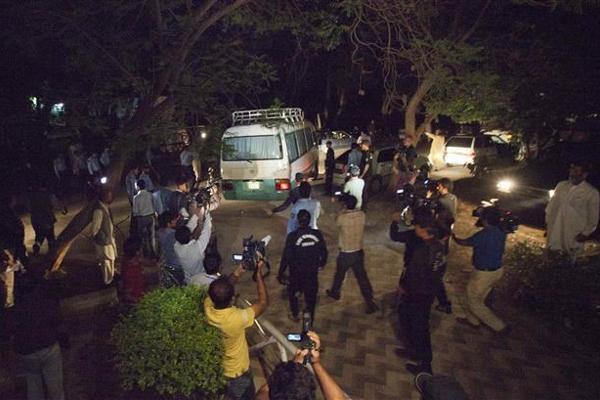Bin Laden family deported from Pakistan: officials
ISLAMABAD - Agence France-Presse


Members of the media chase the vehicle carrying the family members of Osama Bin Laden as they leave for the airport from a house in Islamabad April 26, 2012. REUTERS Photo
Osama bin Laden's family was deported from Pakistan to Saudi Arabia today, nearly a year after the Al-Qaeda leader was killed in a US raid, ending a chapter Islamabad will be glad to put behind it.Around midnight, a minivan whisked the 9/11 mastermind's relatives from the Islamabad house where they had been in detention to the city's airport, where they left for the Gulf kingdom on a specially-chartered flight just before 2:00 am (2100 GMT Thursday).
Bin Laden's three widows and their children were held by the Pakistani authorities after the US special forces raid that killed the Saudi terror chief in the garrison town of Abbottabad, north of Islamabad, on May 2 last year.
Washington and Islamabad are now trying to patch up their relationship which was hammered by the revelation that the world's most wanted man had been living for years just a stone's throw from Pakistan's elite military academy.
The incident was deeply embarrassing to Pakistan and raised questions about whether anyone in authority colluded to conceal bin Laden's presence.
Authorities have already demolished the Abbottabad house and with the one-year anniversary of bin Laden's death just a few days away, they will hope his family's deportation will draw a final veil over a very sorry episode.
An interior ministry spokesman said deportation orders were issued for 14 bin Laden relatives to Saudi Arabia, described as "the country of their choice", though the family was previously thought to number 12 -- three widows, eight children and one grandchild.
After being held for 10 months, the widows and two of bin Laden's older daughters were sentenced by a Pakistani court to 45 days' detention in their Islamabad house on charges of illegal entry and residency in the country and ordered to be deported.
They were originally supposed to be deported after completing their sentence last week but the process dragged on -- officially because legal formalities were not complete but amid suggestions the Saudis were reluctant to accept such a notorious family.
Then on Thursday, a Pakistani security official said "some development happened late in the evening" allowing them to be expelled.
The family's lawyer Atif Ali Khan last week said bin Laden's Yemeni widow Amal Abdulfattah and her five children may be sent to Yemen after Saudi Arabia.
After fleeing Afghanistan in the wake of the 9/11 attacks, bin Laden moved his family around Pakistan before settling in a three-storey house inside a walled compound in the garrison town in 2005.
President Barack Obama's order to "go in and get Bin Laden" was made public Thursday, recorded in a memo scribbled by then-CIA chief Leon Panetta shortly after the decision was made.
The succinct handwritten note, published by Time magazine, was dated April 29, 2011 and signed by Panetta.
"The direction is to go in and get Bin Laden and if he is not there, to get out," wrote Panetta, who is now secretary of defense.
Obama had chosen the riskiest option for the raid -- a secret helicopter assault by US special forces on the compound where bin Laden was believed to be hiding.
The bin Laden family's prolonged detention after the raid fed speculation the Pakistani authorities were worried about what they might reveal about bin Laden's time in the country -- and how he was able to live there for so long undetected.
Analyst Hasan Askari said the military and government will be happy the episode has been consigned to history.
"Osama bin Laden's presence was a reflection on them, so they would like this whole episode to be forgotten because it's embarrassing that they didn't know," he told AFP.
Abdulfattah, 30, bin Laden's youngest and reportedly favourite wife, told Pakistani interrogators that her husband fathered four children while he hid out in Pakistan, according to a police report seen by AFP last month.
Askari said that by sending the family to Saudi, Pakistan might hope to keep any awkward secrets about their stay under wraps.
"One worry would be that one of the wives, especially the younger one, might decide to write a book and Pakistan would not be happy because she would talk about her stay in Pakistan," he said.
"If she writes the story and sells it to a European or American publisher it will be a very saleable commodity, but the Saudis can keep everything under a lid."
